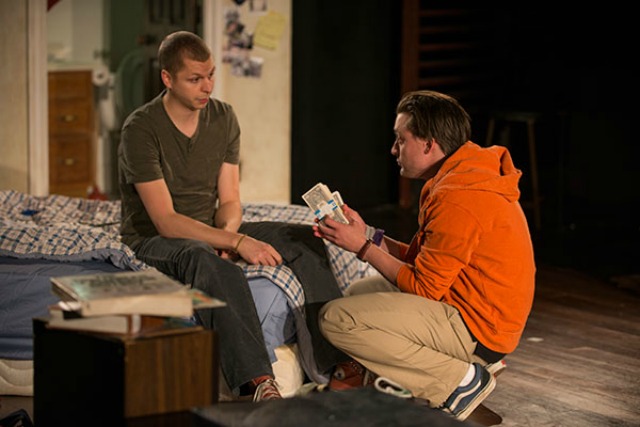Adulthood Adrift In Steppenwolf's 'Youth'
By Melody Udell in Arts & Entertainment on Jun 26, 2014 7:00PM

'This is Our Youth' at the Steppenwolf. Photo by Michael Brosilow.
In playwright Kenneth Lonergan’s 1996 play, This is Our Youth—currently making a pre-Broadway tryout of sorts at the Steppenwolf—there are no cell phones. No Internet. No cyber-bullying or sexting. It’s set in early ‘80s Manhattan, and while the staples of today’s youth culture don’t exist yet, Lonergan’s play shows us that the struggles of Reagan-era teenagers—issues of self-identity, parental distrust, and coping with loss—are eternal problems of youth, no matter the decade.
The show’s three characters are in their late teens and early 20s—the clumsy years when technical adulthood doesn’t require actual adult-like behavior. As Dennis, Kieran Culkin is the play’s driving force. With his parents covering the rent on his studio, Dennis is free to work as an occasional bike messenger and mostly sell drugs to his friends—all similarly privileged city kids. College drop-out Warren (Michael Cera) shows up at Dennis' door after an argument at home, and in quintessential slacker style, the two smoke some strong pot and ponder the complexities of brunch before the crux of the play is revealed: Warren has stolen $15,000 in cash from his father. The two hatch a plan to buy and sell some coke, make a little money off the deal, and then return the cash before Warren’s dad finds out. At some point in that scheme, Dennis hopes to patch things up with his girlfriend and set Warren up with her friend, Jessica (Oak Park native Tavi Gevinson). And like most rash decisions made in a flurry of fear and over-confidence, the plan is doomed before it even begins.
Fresh from her stint directing the Tony-nominated Of Mice and Men on Broadway, director Anna D. Shapiro recognizes that Lonergan’s play is not plot driven, it’s character driven, and she’s brought together a strong cast to implement it. On stage, Culkin is the most refined, which helps anchor his character as the pompous quasi-leader who uses his quick temper as a buffer against criticism. Cera plays a version of his specialty, which he cultivated in roles from Arrested Development, Juno and the like. Cera's Warren is awkward and shiftless, a freeloader with a silent arrogance and penchant for lazy decision making. When Dennis asks why Warren stole his father’s money, Warren just shrugs and deems it “the proceeds of my unhappy childhood.”
As Warren’s love interest, Gevinson’s Jessica is refreshingly unpolished, and despite their near-constant bickering, the two develop a tenuous teenage connection. They move quickly around the scaled-down set, refreshingly devoid of retro kitsch, as they debate esoteric theories of physicality and death. But within their volatile interactions is where Lonergan’s ripe dialogue truly shines.
Like its characters, Youth manages to be simultaneously gritty and moving, heavy without being abrasive—an honest portrait of adolescence that transcends any era of youth.
The show runs through Sunday, July 27 at the Steppenwolf Theatre, 1650 N. Halsted, 312-335-1650 or online.